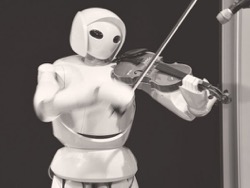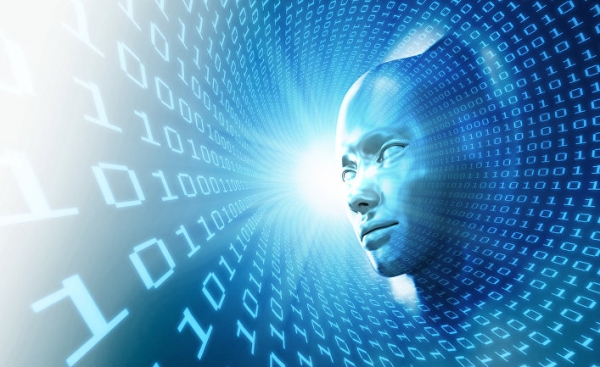
It is believed that by 2030-2040 desktop computer of equal performance with the performance of the human brain. Does this mean that predictions about the “death” of many professions is justified and computers will create a lot of “extra” people?
“Vedomosti” cited the opinion of the founder of ABBYY, David Yang about the risks and opportunities of artificial intelligence.
The world’s first tentative steps into the field of artificial intelligence technology, which think and make decisions as a man, was made in the mid XX century. Today the AI presented in a variety of forms: camera fixing speed, robot vacuum cleaners, voice assistants, sensors, unmanned vehicles, recognition programs, text and voice. The Associated Press is already 3000 the financial statements for the quarter with the help of AI. According to analysts, by 2025, robots performing the role of financial consultants, will manage a budget of 7 trillion dollars. In the world there are more developments on the basis of neural networks, and deep machine learning.
The main role in the breakthrough development of AI the achievements of the so-called deep learning (deep learning) deep neural networks (deep neural networks) and in parallel computing. Starting from 2010-2012, deep neural networks are evolving at an astronomical rate. Hundreds of scientific articles are published every day, decisions that appeared six months ago already are considered outdated.
Literally every month we hear announcements of new wins AI. Recently Google AlphaGo beat the world champion in go – complex of the ancient Chinese Board game. The chat bot in the image of the girl Xiaoice Microsoft’s 10 million people, declared my love, and later Xiaoice was invited to a morning program on China’s Morning News.
It is believed that by 2030-2040 desktop computer of equal performance with the performance of the human brain. You reach the point of singularity, where the computer will become smarter than human, and thus begin to improve themselves faster and better than it does.
The issue that has concerned many: a need to be a man, when the AI will learn to perform more tasks and take over many of the profession? According to scientists from Oxford, about 47% of jobs in the United States are at risk and there is every chance that by 2025 they will be fully replaced by technology. White house economists are predicting that AI will take the place of all the workers with wages below $ 20 per hour. It turns out that without a job will be 350 million employees who work in manufacturing or warehouses. These are the areas where the AI is easy to replace man and makes his work more effective and much cheaper. In the commodity warehouses Amazon now employs 30 000 robots, saving time and money from the company.
Bank of America Merrill Lynch predicts that within 10 years the annual economic effect from the introduction of AI will be 14-33 trillion dollars. According to the Bank, the implementation of robots and AI can improve performance by 30% in many industries in reducing the cost of labor for 18-33%.
Today on the creation of more advanced machines and technologies of AI are hundreds of thousands of engineers in the world. In Silicon valley there is a completely unprecedented investor interest in these technologies, and everything connected with them. In the second quarter of 2016, the share of investments in AI have increased compared to other major areas (e.g., digital medicine). By June 2016, more than 200 companies focused on AI, attracted more than $ 1.5 billion. The number of investment transactions including start-UPS over the past few years rose from 70 in 2011 to 400 in 2015.
The stability of this industry stems from the fact that the technology of AI to promote the creation of a huge number of brand new products and niches.
So should we be afraid that in less than 10 years, almost half of us remain without work? I don’t think. If 150 years ago, analysts looked to see what technology will be used at the beginning of the XXI century, they’d also decided that in the 2010s, none of us will any work. But we know that it is not.
Even if machines take over some human functions, the demand for human labor still remains. So, in the 1980s in the United States were actively implemented bar code scanners and POS systems. This has reduced the cost of labor in the stores, but the cashiers have not disappeared. In 1980-2013. their employment is still growing on average by more than 2%.
There remains a huge gap between what people know and what can robots and AI. Relatively easy to automate mundane work, but there are many unusual problems to cope with which machines is difficult
.For example, it is handmade, which seems simple for humans, but is unbearable for the machine. This phenomenon is known as the paradox of Moravek. To fold a towel, you have a few seconds. In 2010 the robot to perform this task required almost 25 minutes. Cooks, gardeners, plumbers, carpenters, dentists in the near future will definitely not be replaced by machines. All these professions are associated with sensorimotor work, and many of them also require the skills of idea generation, pattern recognition in large volumes and build complex relationships.
AI is difficult to perform the work, where it is important to build interpersonal relationships. The machines have weak social skills. They will not be able to perform tasks related to human interaction, such as, for example, motivation, psychological support and care. Salespeople, managers and entrepreneurs, nurses, teachers at kindergartens, too easy to replace the machine.
Man has always distinguished the ability to think creatively, it is hardly possible to teach the machine. Technology gradually take over the routine tasks, and we will continue to think about eternity, to write poetry and think. And digital technology is largely complementary and not replace work. In the words of MIT economist Erik brynjolfsson’s, one of the authors of the book The Second Machine Age, now is the best time for creative people who create something new: a song, video or software. Yes, the development of artificial intelligence leads to automation and reduction of human resources at the decision of routine tasks. However, progress in this area not only reduces jobs but creates new ones, as well as all the latest technology. They open up markets that previously it was impossible to imagine.
The US Department of labor predicts that by 2020 appears 1.2 million new jobs associated with computer technology. And Harvard Business Review named data scientist the most popular and attractive profession of the XXI century.
In addition to specialized professions will be new jobs and in technological ecosystem: the lawyer for robotika, the designer of the human body, an engineer for the restoration of the natural environment, space guide, etc. now there are not only teachers, teaching people the programming skills and development, but those who teach this machine. Moreover, these trainers appear in almost all the industries: law, healthcare, etc. To the AI was able to accomplish the work of man, it is not enough to teach it. It is necessary to describe all the processes of the new organization of labor. And efficiently be able to do it only those people, whose work would later take on the robots.
According to analysts from the McKinsey Global Institute (MGI), through advances in AI society in the near future will change 10 times faster and 300 times bigger. And it gives endless possibilities to create new products, services, businesses and the reallocation of jobs, because people will be new challenges. We live in interesting times! We just need to adapt to modernity, to develop new, more marketable profession, and learn key competencies which neither the robot or the algorithm will not be able to replace.
And most importantly, despite all the technological breakthroughs, people will always remain human. Our main role is to continue its own DNA.







